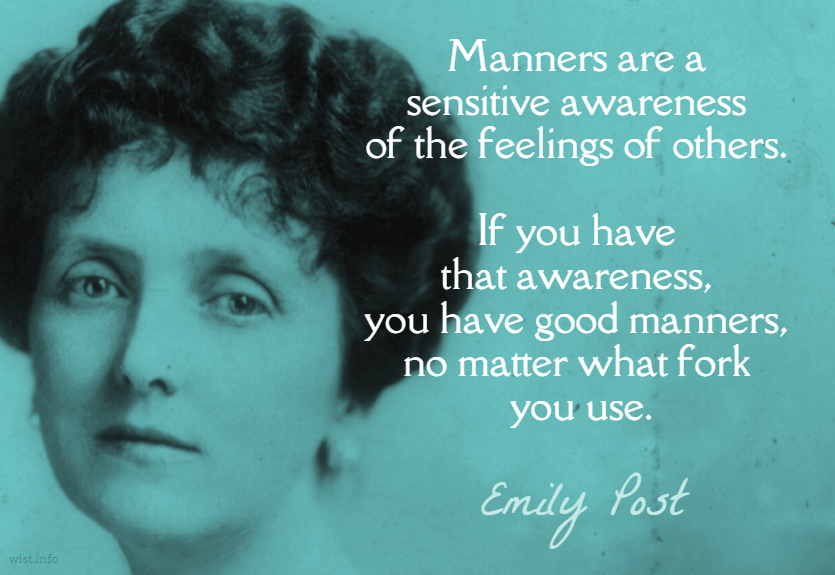We may define all the essentials of politeness, but we cannot determine how and where they should be used; they depend on ordinary habits and customs, are connected with times and places, and are not the same in both sexes nor in different ranks of life; intelligence alone cannot find this out; politeness is acquired and perfected by imitation.
[L’on peut définir l’esprit de politesse, l’on ne peut en fixer la pratique: elle suit l’usage et les coutumes reçues; elle est attachée aux temps, aux lieux, aux personnes, et n’est point la même dans les deux sexes, ni dans les différentes conditions; l’esprit tout seul ne la fait pas deviner: il fait qu’on la suit par imitation, et que l’on s’y perfectionne.]Jean de La Bruyère (1645-1696) French essayist, moralist
The Characters [Les Caractères], ch. 5 “Of Society and Conversation [De la Société et de la Conversation],” § 32 (5.32) (1688) [tr. Van Laun (1885)]
(Source)
(Source (French)). Alternate translations:
We may define Politeness, tho we can't tell where to fix it in practice. It observes received Uses and Customs, 'tis bound to times and places, and is not the same thing in the two Sexes, or in different conditions. Wit alone cannot attain it: 'tis acquired and compleated by Imitation.
[Bullord ed. (1696)]
We may define Politeness, tho we can't tell where to fix it in Practice. It observes receiv'd Uses and Customs, is bound to Times and Places, and is nto the same thing in the two Sexes, or in different Conditions; Wit alone cannot attain it, 'tis acquir'd and brought to perfection by imitation.
[Curll ed. (1713)]
It is possible to define the spirit of politeness, but not to lay down rules for its practice: it depends on custom and convention; it is related to periods and places and people, and it is not the same for the two sexes nor for various social conditions; one cannot attain it through intelligence alone, yet intelligence can enable one to imitate it, and to acquire perfection in it.
[tr. Stewart (1970)]
Quotations about:
etiquette
Note not all quotations have been tagged, so Search may find additional quotes on this topic.
There is no known correct way to eat pistachio nuts. Nevertheless, they are delicious. The pistachio nut must therefore be Nature’s way of teaching us self-control. If so, it doesn’t work.
It is wrong to wear diamonds before dusk, except on one’s marriage rings. Before, after, and during breakfast, luncheon and dinner, it is vulgar to wear a mixture of colored precious stones. It is always a comfort to know that so many things one can’t afford to do anyway are vulgar.
Civilization has taught us to eat with a fork, but even now if nobody is around we use our fingers.
DEAR MISS MANNERS: What is the proper way to eat potato chips?
GENTLE READER: With a knife and fork. A fruit knife and an oyster fork, to be specific. Good heavens, what is the world coming to? Miss Manners does not mind explaining the finer points of gracious living, but she feels that anyone without the sense to pick up a potato chip and stuff it in their face should probably not be running around loose on the streets.
DEAR MISS MANNERS: What should I say when I am introduced to a homosexual “couple”?
GENTLE READER: “How do you do?” “How do you do?”
Judith Martin (b. 1938) American author, journalist, etiquette expert [a.k.a. Miss Manners]
Miss Manners’ Guide to Excruciatingly Correct Behavior, ch. 3 “Basic Civilization” (1983)
(Source)
If you are required by society to be polite — of course it’s a voluntary system policed only by public opinion — you run into having to have equal respect for people who are not as rich and powerful as you. More than that, because of the concept of noblesse oblige, you are required to treat them even better. So etiquette is the greatest friend of the powerless; without it, might makes right.
Judith Martin (b. 1938) American author, journalist, etiquette expert [a.k.a. Miss Manners]
“Polite Company,” interview by Hara Estroff Marano, Psychology Today (1998-03)
(Source)
If you want to go off by yourself and be a hermit, you can do whatever you want. But if you want interaction with other people, then by definition you have to buy into the social contract and restrain some of your behavior some of the time.
Judith Martin (b. 1938) American author, journalist, etiquette expert [a.k.a. Miss Manners]
“Polite Company,” interview by Hara Estroff Marano, Psychology Today (1998-03)
(Source)
Teacup formality is a part of etiquette, but an infinitesimal part. How about fast-food informality? That is as much a part of etiquette as the teacup. It is all of our behavior and not simply the formal occasion behavior. And, in fact, the more informal the circumstances, usually the more you need etiquette.
Judith Martin (b. 1938) American author, journalist, etiquette expert [a.k.a. Miss Manners]
“Polite Company,” interview by Hara Estroff Marano, Psychology Today (1998-03)
(Source)
Etiquette is about all of human social behavior. Behavior is regulated by law when etiquette breaks down or when the stakes are high — violations of life, limb, property, and so on. Barring that, etiquette is a little social contract we make that we well restrain some of our more provocative impulses in return for living more or less harmoniously in a community.
Judith Martin (b. 1938) American author, journalist, etiquette expert [a.k.a. Miss Manners]
“Polite Company,” interview by Hara Estroff Marano, Psychology Today (1998-03)
(Source)
Etiquette means behaving yourself a little better than is absolutely essential.
Will Cuppy (1884-1949) American humorist, satirist, literary critic
How to Be a Hermit, “A Few Hints on Etiquette” (1929)
(Source)
Etiquette is a set of rules people use so they can be rude to each other in public.
And when thou hast blowne thy nose, use not to open thy handkercheif, to glare uppon thy snot, as if yu hadst pearles and rubies fallen from thy braynes.
[Non si vuole anco, soffiato che tu ti sarai il naso, aprire il moccichino e guatarvi entro, come se perle o rubini ti dovessero esser discesi dal cielabro.]
Giovanni della Casa (1503-1556) Florentine poet, author, diplomat, bishop
Galateo: Or, A Treatise on Politeness and Delicacy of Manners [Il Galateo overo de’ costumi], ch. 3 (1558) [tr. Peterson (1576)]
(Source (Italian)). Alternate translations:
It is moreover extremely indecent [...], when you have blown your nose, to draw aside and examine the contents of your handkerchief; as if you expected pearls or rubies to distil from your brain.
[tr. Graves (1774)]
And when you have blown your nose you should not open your handkerchief and look inside, as if pearls or rubies might have descended from your brain.
[tr. Einsenbichler/Bartlett (1986)]
DEAR MISS MANNERS: How about Easter? I suppose you have etiquette rules that apply to Easter Day?
GENTLE READER: Certainly, and when the Day of Judgment comes, Miss Manners will have etiquette rules to apply to that, as well.
Judith Martin (b. 1938) American author, journalist, etiquette expert [a.k.a. Miss Manners]
Miss Manners’ Guide to Excruciatingly Correct Behavior, Part 9 “Advanced Civilization,” “Play” (1983)
(Source)
It would be difficult for anyone with normal powers of observation to believe that there is a link between having money and behaving well.
Judith Martin (b. 1938) American author, journalist, etiquette expert [a.k.a. Miss Manners]
Twitter (2022-01-16)
(Source)
There are etiquette rules being spread all over the Internet. They often use new terms for old rudenesses. Flaming is insulting people. Spamming is trying to do business while other people are having a social time. Having spent a lifetime with people who tell me I must be old-fashioned to care about etiquette, I could, if I were not so polite, turn around and say, “Nyah nyah nyah nyah nyah, you’re the one who is old-fashioned if you think that etiquette is old-fashioned — you obviously don’t spend time on the Internet.”
Judith Martin (b. 1938) American author, journalist, etiquette expert [a.k.a. Miss Manners]
In “Polite Company,” interview by Hara Estroff Marano, Psychology Today (1998-03)
(Source)
The other part of it is [the belief that] if we just totally opened our souls to one another, we would love one another and get along. This trivializes the fact that people have deep and legitimately-held differences. People think, mistakenly, that etiquette means you have to suppress your differences. On the contrary, etiquette is what enables you to deal with them; it gives you a set of rules. On the floor of the Congress, you don’t say, “You’re a jerk and a crook”; you say, “I’m afraid the distinguished gentleman is mistaken about so and so.” Those are the things that enable you to settle your differences, to bring them out in the open. Everything else just starts battles.
Judith Martin (b. 1938) American author, journalist, etiquette expert [a.k.a. Miss Manners]
In “Polite Company,” interview by Hara Estroff Marano, Psychology Today (1998-03)
(Source)
Queerly shaped pieces of flat silver, contrived for purposes known only to their designers, have no place on a well appointed table. So if you use one of these implements for a purpose not intended, it cannot be a breach of etiquette, since etiquette is founded on tradition, and has no rules concerning eccentricities.
Emily Post (1872-1960) American author, columnist [née Price]
Etiquette: The Blue Book of Social Usage, ch. 37 “Flat Silver” (1922; 1927 ed.)
(Source)
Manners are a sensitive awareness of the feelings of others. If you have that awareness, you have good manners, no matter what fork you use.
Emily Post (1872-1960) American author, columnist [née Price]
(Attributed)
Often cited to her famous Etiquette in Society, in Business, in Politics, and at Home (1922), but not found in that work. Claimed as genuine by the Emily Post Institute.
There are three possible parts to a date, of which at least two must be offered: entertainment, food, and affection. It is customary to begin a series of dates with a great deal of entertainment, a moderate amount of food, and the merest suggestion of affection. As the amount of affection increases, the entertainment can be reduced proportionately. When the affection is the entertainment, we no longer call it dating. Under no circumstances can the food be omitted.








